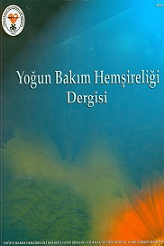Muğla ve Menteşe Devlet Hastaneleri Yoğun Bakım Servislerinde Çalışan Hemşirelerin Motivasyon Düzeylerinin Belirlenmesi
Amaç: Bu çalışmanın amacı, Muğla ve MenteşeDevlet Hastaneleri yoğun bakım servislerinde çalışan hemşirelerin motivasyon düzeylerini belirlemektir.Gereç ve Yöntem: Araştırmanın evrenini Muğlave Menteşe Devlet Hastaneleri kardiyoloji, dahiliye ve cerrahi yoğun bakım servislerinde çalışan30 hemşire oluşturmaktadır. Verilerin toplanmasında, sosyo-demografik özelliklerin sorgulandığıve motivasyon envanterinin yer aldığı iki bölümden oluşan anket formu kullanılmıştır. Verilerindeğerlendirilmesinde, ortalama, standart sapma,yüzdelik, Mann Whitney U ve Kruskal Wallis yöntemleri kullanılmıştır.Bulgular: Yapılan istatistiksel analiz sonucundahemşirelerin %53.3’ünün motivasyon düzeyininorta, %47.3’ünün ise düşük olduğu tespit edildi.Ayrıca motivasyon içgüdüsel faktörleri ile çalışmaşekli arasında ve motivasyon dışsal faktörleri ilehemşirelik mesleğini isteyerek seçme durumuarasında anlamlı bir ilişki bulundu (p < 0.05).Sonuç: Hemşirelerin çalışma şekilleri ile mesleklerini bilinçli seçmelerinin iş hayatında motivasyonlarını etkilediği belirlendi. Bu nedenle eğitimve sağlık sektörlerinde kurumsal olarak motivasyonu artıran stratejilerin geliştirilmesinin yararlıolacağı görüşüne varıldı
Anahtar Kelimeler:
Yoğun bakım, motivasyon, hemşire
Determining the Motivation Levels of the Nurses Working at Intensive Care Wards of Muğla and Menteşe State Hospitals
Objectives: This study aims to determine the motivation levels of the nurses who work at intensive care wards of Mu¤la and Mentefle state hospitals. Materials and Methods: Thirty nurses working at cardiology, internal and surgical intensive care units of Mu¤la and Mentefle state hospitals composes the basis of this study. A surgery form, composed of two sections; motivation data and socio-demografic characteristics, has been used to collect data. To asses the data, descriptive statistics (means, frequencies, standard deviation) and non-parametric tests (Mann-Whitney U and Kruskal-Wallis) have been used. Results: Statistical analysis results showed that 53.3% of the nurses had a fair level of motivation, and 43.7% of them had a low level of motivation. We also found a significant relation between instinctive motivational factors and the working style, and between external motivational factors and having chosen this job voluntarily (p < 0.05). Conclusion: It was found that the working style and conscious selection of their profession affect nurses' motivation in their professional life. Hence, it was concluded that developing strategies in educational and medical institutions that enhance the organizational motivation would be useful.
Keywords:
Intensive care, motivation, nurses,
- ISSN: 1302-0498
- Başlangıç: 1997
- Yayıncı: Yoğun Bakım Hemşireler Derneği
Sayıdaki Diğer Makaleler
FLORENCE NIGHTINGALE HEMŞİRE MEKTEPLERİ VE HASTANELERİ VAKFI
III. ULUSAL YOĞUN BAKIM HEMŞİRELERİ KONGRESİ HAKKINDA
Kalp Hastalarında Ruhsal Sorunlar ve Bakımın Psikososyal Boyutu
Yoğun Bakım Hemşirelerinin Yaşam Kalitesi, İş Doyumu ve Tükenmişlik Düzeylerinin Saptanması
Nurgül GÜNGÖR, Nazmiye ÇIRAY, Şirin VATANSEVER, Asiye DURMAZ AKYOL
Çocukluk Çağında Kardiyolojik İnvaziv Girişimler ve Hemşirelik Bakımı
Yoğun Bakım Ünitelerinde Sağlık Ekibi Üyeleri, Hasta ve Yakınları ile İletişim
Nöroloji Yoğun Bakım Ünitelerinde Yatan İnmeli Hastalarda Basınç Ülserleri
